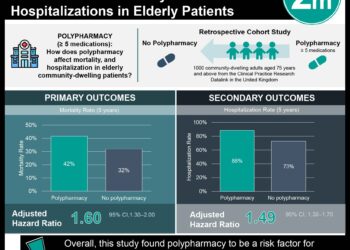Early detection and treatment of cardiac implantable electronic device-related infections associated with reduced mortality
1. In this cohort study, among 19 559 patients undergoing cardiac implantable electronic device (CIED) procedures, 177 developed a CIED infection requiring hospitalization, with a total of 109 cases of localized infections and 68 cases of systemic infections.
2. Individuals with early systemic infections and delayed localized infections were at a higher risk of mortality, and those with delayed systemic infections were at the greatest risk of mortality.
Evidence Rating Level: 2 (Good)
Study Rundown: Cardiac implantable electronic device (CIED) infection is a known and serious complication of CIED procedures, with an estimated 1-year mortality as high as 30%. Retrospective data indicate that the incidence of CIED infections is highest within the first year of device implantation. However, the association of the extent and timing of infection with all cause-morality has not been established. This prospective cohort study aimed to evaluate the association of the extent and timing of CIED infection with all-cause mortality. A total of 19 599 patients undergoing CIED procedures were included from 28 centers across Canada and the Netherlands. Of the included participants, 177 developed a CIED infection. The incidence of CIED infection at 12 months was 0.9%, compared to 0.6% at 3 months. The greatest risk of infection was found to occur within the first 3 months after CIED procedure, with the risks significantly reduced by 6 months. Infection rates were highest in the first 3 months (0.21% per month). Patients with early localized infections were not at a higher risk for mortality. Early localized infections were not at higher risk for all-cause mortality when compared to patients without a CIED infection. However, patients with early systemic disease and delayed local infections had a 3-fold increase in mortality. A strength of this study was that it is the largest prospective cohort of patients with CIED infections at this time. A limitation, however, is that there is a lack of statistically significant decrease in baseline characteristics which could be associated with smaller numbers within the group and also could have distorted the findings in relation to mortality. Overall, this study emphasizes that early detection and treatment of CIED infections may reduce mortality associated with the complications accompanying the CIED procedure.
Click to read the study in JAMA Cardiology
Relevant Reading: Epidemiology of cardiac implantable electronic device infections: incidence and risk factors
In-Depth [prospective cohort]: This study evaluated the association of the extent and timing of CIED infections with all-cause mortality among 19 559 patients (mean [SD] age, 68.9 [12.7] years, 25.4% female). The study was conducted between December 2010 and September 2016 in 28 centers across Canada and the Netherlands. The main exposure of this study was prospectively identified CIED infections. A time-dependent analysis of the timing (early [ < 3 months] or delayed [3-12 months]) and extent (localized or systemic) of infection was completed to assess the risk of all-cause mortality associated with CIED infections. Of the 19 559 patients included, a total of 177 developed a CIED infection with 109 cases (62%) of localized infection and 68 cases (38%) of systemic infection. The incidence of CIED infections after a procedure was 0.6% at 3 months, 0.7% at 6 months, and 0.9% at 12 months. Infection relates were highest in the first 3 months (0.21%), reducing significantly. When compared with patients who did not have CIED infection, those with early localized infections were not at higher risk for all-cause mortality (no deaths at 30 days [0 of 74 patients]: adjusted hazard ratio [aHR], 0.64 [95% CI, 0.20 – 1.98] P = .43). Patients with early systemic and delayed localized infections had a considerable increase in mortality (8.9% 30-day mortality [4/45 patients]: aHR 2.88 [95% CI, 1.48 – 5.61]; P = .002; 8.8% 30-day mortality [3 of 34 patients]: aHR 3.57 [95% CI, 1.33 – 9.57]; P = .01). This increased to a 9.3-fold risk of death for those with delayed systemic infections (21.7% 30-day mortality [5 of 23 patients]: aHR, 9.30 [95% CI, 3.82-22.65]; P < .001).
Image: PD
©2023 2 Minute Medicine, Inc. All rights reserved. No works may be reproduced without expressed written consent from 2 Minute Medicine, Inc. Inquire about licensing here. No article should be construed as medical advice and is not intended as such by the authors or by 2 Minute Medicine, Inc.




![siRNA against antithrombin alleviates symptoms of hemophilia [PreClinical]](https://www.2minutemedicine.com/wp-content/uploads/2015/04/clot-CCWiki-350x250.jpg)


